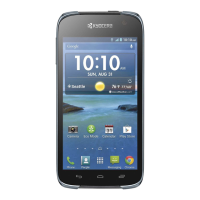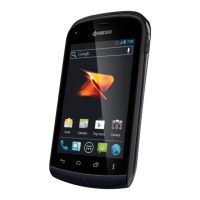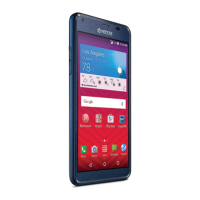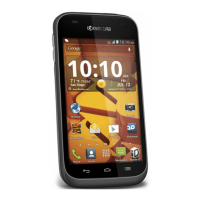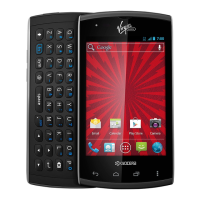Do you have a question about the Kyocera HYDRO VIBE and is the answer not in the manual?
Overview of the phone's external features and buttons.
Steps to open the cover, insert the battery, and close.
Instructions for charging the phone via USB cable.
Guide to charging the phone using a wireless charging accessory.
Instructions for inserting or reinstalling the SIM card.
Steps to set up a Virgin Mobile account and choose a plan.
Process for activating the phone automatically or manually.
Accessing account information like minutes and plan details.
Options for adding money to the account, including Auto Pay.
Contact information for further details about the account.
Steps to set up voicemail with a password, name, and greeting.
Illustrations and descriptions of the phone's external features and buttons.
Detailed explanation of the phone's physical buttons and indicators.
Information on the internal receiver and how to optimize hearing.
Explanation of basic touch, touch and hold gestures for screen interaction.
How to move fingers vertically or horizontally across the screen.
How to press, hold, and move an item on the screen.
How to swipe with light, quick strokes.
Automatic screen orientation changes based on phone position.
Adding icons, shortcuts, folders, and widgets to the home screen.
Explanation of Standard and Easy modes and screen elements.
Switching between Easy and Standard home screen modes.
Adding, moving, or removing items from the home screen.
Selecting and setting the phone's background wallpaper.
Adding and configuring the clock and weather widget.
How to open the panel for quick access to common phone settings.
Icons indicating phone and service status, and notification alerts.
Overview of available onscreen keyboards for text input.
Using Swype for text input by drawing paths between letters.
Using Google Keyboard for traditional QWERTY text input.
Using voice recognition to convert speech to text.
How to copy, cut, paste, and edit text using the phone.
Various methods for placing phone calls.
Making calls using the phone's dialpad.
Placing calls to recent incoming, outgoing, or missed numbers.
Making calls directly from the Contacts list.
How to call emergency services like 9-1-1.
Making calls using an Internet calling account over Wi-Fi.
How to answer, mute, or reject incoming calls.
Steps to set up voicemail and personal greeting.
How the phone alerts you to new voicemail messages.
Accessing voicemail messages via phone or other touch-tone phones.
Setting up Visual Voicemail, including password and greeting.
Accessing and reviewing visual voicemail messages.
Navigating and listening to multiple voicemail messages sequentially.
Recording and sharing a visual voicemail message.
Available options for reviewing and managing visual voicemail messages.
Customizing settings for voicemail notifications, greetings, and themes.
Directly changing the main voicemail greeting through the system.
Changing the name or number attached to voice messages.
Onscreen options available during an active phone call.
Managing caller ID settings and displaying your number.
Handling multiple incoming calls while on an active call.
Conducting conference calls with three participants.
Forwarding incoming calls to another phone number.
Accessing and viewing the history of incoming, outgoing, and missed calls.
Accessing and viewing the history of incoming, outgoing, and missed calls.
Options for managing and filtering call logs.
Configuring voicemail, call forwarding, and other phone settings.
Configuring voicemail provider and access settings.
Settings for dialing numbers within North America.
Settings for dialing international numbers.
Enabling telecommunications device for the deaf mode.
Basics of using the People application for managing contacts.
Ways to display and access the phone's contacts list.
Navigating and viewing entries in the contacts list.
Optional features available in the contacts list, like display and sorting.
Selecting which contacts to display and how they are sorted.
Entering details to add a new contact to the phone.
Saving a phone number directly from the dialpad to contacts.
Adding or editing information for existing contacts.
Adding or editing details within an existing contact entry.
Assigning a picture stored in memory to a contact.
Taking a new picture and assigning it to a contact.
Setting a unique ringtone for individual contacts.
Setting a specific vibration pattern for contact alerts.
Adding frequent contacts to the Favorites tab for quick access.
Transferring a contact's call directly to voicemail.
Placing favorite contacts as widgets on the home screen.
Removing a contact from the phone's details page.
Creating a group contact with multiple personal entries.
Managing existing group contacts, including renaming or removing.
Options for modifying group contacts.
Removing a group contact from the phone.
Registering and managing emergency contact information.
Registering up to five emergency contacts for quick access.
Registering personal or medical information for emergency use.
Syncing contact data between the phone and online accounts.
Sharing contact information via Bluetooth, email, Gmail, or text messaging.
Accessing Google services like Gmail, Maps, and Play Store.
Steps to create a new Google Account online or on the phone.
Logging into an existing Google Account on the phone.
Viewing, reading, and replying to Gmail messages on the phone.
Composing and sending emails using the Gmail app.
Reading, replying to, and forwarding Gmail messages.
Sending and receiving email from various accounts.
Setting up personal or corporate email accounts from Settings or the Email app.
Setting up a corporate email account, possibly Exchange ActiveSync.
Writing and sending emails, including attachments.
Reading and responding to emails received on the phone.
Options for viewing and deleting email messages.
Editing general settings for the email application.
Customizing settings for individual email accounts.
Sending and receiving text and multimedia messages.
Composing and sending SMS text messages.
Sending messages with pictures, audio, video, or slideshows.
Adding slides with pictures, video, or audio to a multimedia message.
Saving a message in progress and resuming it later.
How the phone notifies you of new text or multimedia messages.
Grouping messages into conversations or threads.
Opening and reading text messages or message threads.
Merging segmented SMS messages or separating combined ones.
Opening and viewing multimedia message attachments.
Responding to text or multimedia messages.
Removing entire message conversations.
Removing all message threads at once.
Removing individual messages from a thread.
Selecting and deleting multiple messages.
Accessing contact details from a message thread.
Configuring message limits, size, and notifications.
Configuring the phone to receive government-issued alerts.
Using Facebook for updates, photos, and check-ins.
Downloading and installing the Facebook application from Google Play.
Logging into an existing Facebook account.
Using Google+ for friend updates and chat.
Watching and sharing videos on YouTube.
Finding and downloading Android apps, books, and movies.
Steps to search for and install applications from Google Play.
Setting up a Google Wallet account for purchases.
Accessing store home, apps, wishlist, and redemption options.
Asking for a refund for an app within 24 hours of purchase.
Launching applications already installed on the phone.
Removing downloaded applications from the phone.
Accessing online help for the Google Play Store.
Using location-based services for navigation and finding places.
Activating GPS and network location services for navigation.
Using Google Maps for directions, local search, and reviews.
Determining the phone's current location on the map.
Searching for locations, addresses, or types of establishments on the map.
Obtaining directions to a destination by various modes of transport.
Discovering, downloading, and listening to music.
Browsing, shopping, and playing music from Google Play or a personal library.
Playing music using the Google Play Music application.
Searching for and purchasing music from the Google Play store.
Accessing settings and help for the Google Play Music app.
Downloading and watching movies and TV shows via Google Play.
Shopping for and reading e-books through Google Play Books.
Discovering and reading news and articles via Google Play Newsstand.
Installing downloadable mobile experiences and customization packs.
Switching between installed ID Packs on the phone.
Connecting to wireless networks for Internet access.
Enabling Wi-Fi and connecting to available wireless networks.
Verifying the status of the current wireless network connection.
Scanning and connecting to alternative Wi-Fi networks.
Tool for automatically selecting the best mobile network and remembered Wi-Fi networks.
Activating the feature to automatically select the best network.
Managing and using the phone's data services for Internet access.
Opening the browser to access the Internet.
Understanding icons that show data connection status.
Setting up and managing virtual private network connections.
Steps needed before establishing a VPN connection.
Downloading and installing security certificates for VPN access.
Configuring and adding a new VPN connection to the phone.
Establishing and terminating VPN connections.
Opening the built-in web browser application.
Basic navigation within menus and websites during a data session.
Moving up and down to view content on web pages.
Highlighting, copying, and sharing text from web pages.
Entering a website address to navigate to a specific page.
Accessing browser options like stop, refresh, and bookmarks.
Configuring general, privacy, security, and advanced browser settings.
Creating custom settings for individual websites.
Restoring browser settings to their original default state.
Customizing the browser's default homepage.
Setting up and using custom bookmarks for easier browsing.
Setting a previously visited web page as the new homepage.
Adding web bookmarks to the phone's home screen for quick access.
Turning the phone into a Wi-Fi hotspot.
Connecting other devices to the phone's Wi-Fi hotspot.
Adjusting network name, security, and client settings for the hotspot.
Sharing the phone's Internet connection with Bluetooth devices.
Instructions on how to capture photos using the phone's camera.
Launching and exiting the camera application.
Understanding the camera's viewfinder controls and options.
Steps to take high-resolution pictures with the camera.
Options available after taking a picture, like share or delete.
Instructions on how to record high-quality videos.
Adjusting advanced camera settings for photos and videos.
Capturing panoramic images by stitching multiple shots.
Viewing and managing photos and videos stored on the phone.
Launching and exiting the Gallery application.
Accessing and viewing stored media files.
Adjusting the zoom level when viewing pictures.
Playing and controlling video playback.
Performing operations on pictures like editing, rotating, and cropping.
Menu for deleting, editing, rotating, cropping, and setting pictures.
Using the built-in tool to alter captured pictures.
Rotating and saving picture modifications.
Resizing or cropping pictures to specific dimensions.
Sending media files via email, MMS, social networks, or Bluetooth.
Attaching and sending media files in email or Gmail messages.
Sending media files as MMS messages.
Transferring media files wirelessly to other devices via Bluetooth.
Uploading photos and videos directly to a Facebook account.
Sharing media files to a Google+ account.
Uploading pictures to Picasa for organization and sharing.
Uploading videos to YouTube for sharing.
Managing events, meetings, and appointments in the calendar.
Creating new events directly within the Calendar application.
Inviting participants to calendar events via email.
How the phone alerts users to scheduled events.
Setting and managing reminders for upcoming calendar events.
Displaying calendar events in daily, weekly, monthly, or agenda views.
Deleting scheduled events from the calendar.
Choosing which calendars to display or hide in the current view.
Selecting Google Calendars for synchronization with the phone.
Using the clock app for alarms, stopwatch, timer, and world clock.
Setting and managing multiple alarms on the phone.
Steps to configure a new alarm with time, label, and repeat options.
Removing alarms from the clock application.
Configuring clock style, home clock, time zone, and alarm behavior.
Using the built-in stopwatch to record split or lap times.
Using the phone as a countdown timer.
Calculating and displaying current time in different time zones.
Performing basic mathematical calculations.
Using the phone's camera flash as a flashlight.
Recording and saving sounds or voice data.
Steps to start, pause, and end voice recordings.
Accessing and playing back recorded voice data.
Managing recorded voice data, including sharing and deletion.
Enlarging select text on the screen for improved readability.
Using voice commands for calls, text conversion, and search.
Using voice commands to dial numbers or launch functions.
Finding information on the web or phone using voice search terms.
Enabling Eco Mode to save battery life by adjusting phone settings.
Enabling or disabling the phone's Bluetooth capabilities.
Accessing information and controls for Bluetooth features.
Renaming the phone for Bluetooth identification.
Pairing and connecting Bluetooth audio devices.
Manually disconnecting or unpairing Bluetooth devices.
Transferring files between the phone and other Bluetooth devices.
Sending images, videos, or contacts via Bluetooth.
Receiving files from other Bluetooth devices.
Enabling or disabling the phone's NFC capabilities.
Steps to insert a microSD card into the phone.
Safely unmounting and removing the microSD card.
Checking the storage information for the inserted microSD card.
Erasing all data from the microSD card.
Unmounting the microSD card before removal to prevent data corruption.
Connecting the phone as a USB drive to transfer files.
Connecting the phone to a computer for file transfer via USB.
Downloading and installing software updates for the phone.
Important steps to take, like backing up data, before updating firmware.
Checking the current version of the phone's firmware.
Updating online user profile information automatically.
Downloading and updating the preferred roaming list automatically.
Updating the phone's Android OS and firmware via network.
Configuring Wi-Fi networks, including advanced options.
Navigating to the Wi-Fi settings menu.
Setting up and managing wireless access points and advanced Wi-Fi options.
Managing Bluetooth connections, file transfers, and device settings.
Conserving battery by blocking background data for unused apps.
Monitoring and managing mobile and Wi-Fi data usage.
Accessing additional network options like Airplane Mode and VPN.
Enabling Airplane Mode to disable wireless communications.
Configuring virtual private network connections for secure access.
Configuring settings for sharing phone data service.
Enabling and configuring Near Field Communication features.
Beaming files to NFC-capable devices by holding them close.
Managing mobile data access, network mode, and operators.
Automatically selecting the best mobile network for optimal performance.
Setting the phone's display appearance to Standard or Easy mode.
Adjusting audio settings for ringtones, alerts, and touch tones.
Configuring volume levels for media, ringtones, alarms, etc.
Assigning a ringtone to incoming calls.
Customizing vibration patterns for notifications and touch feedback.
Setting the phone to ring and vibrate simultaneously.
Setting alerts like beep, vibrate, or LED blinking for notifications.
Selecting a default sound for all notifications.
Playing tones when using the dialpad.
Playing sounds for onscreen selections.
Playing sounds when locking and unlocking the screen.
Enabling vibration feedback when typing.
Using hearing aid devices effectively with the phone.
Adjusting screen settings for visibility and battery life.
Adjusting screen brightness for visibility and battery life.
Selecting and assigning a background wallpaper for the phone.
Automatically changing screen orientation based on phone rotation.
Setting the delay time before the screen automatically turns off.
Displaying photos, colors, or clocks when the phone is charging or docked.
Adjusting the size of text displayed on the screen.
Setting the delay time for the key backlight to turn off.
Showing the battery percentage next to the battery icon.
Streaming multimedia content to Miracast-compatible displays.
Adjusting the distance for the proximity sensor during calls.
Managing phone internal storage and microSD card options.
Viewing the phone's internal storage capacity and available space.
Changing the primary storage location for the phone.
Options for viewing SD card space, unmounting, and formatting.
Unmounting the SD card before removal to prevent data corruption.
Erasing all data from the SD card.
Monitoring phone battery usage and charge status.
Setting the phone's default connection mode when connected to a computer.
Viewing and managing applications installed on the phone.
Selecting how the phone determines its location.
Setting up and customizing phone unlock methods.
Increasing phone security by creating a screen lock.
Setting the screen lock to Swipe pattern for unlocking.
Using facial recognition for unlocking the phone.
Setting a screen unlock pattern by connecting dots.
Setting a numerical PIN for screen unlock security.
Setting an alphanumeric password for screen unlock security.
Turning off the current screen lock feature.
Capturing face in different conditions to improve Face Unlock accuracy.
Requiring blinking during Face Unlock for enhanced security.
Setting the delay time for the screen lock to activate after sleep.
Activating screen lock immediately by pressing the Power Button.
Displaying owner information on the lock screen.
Setting options for quick app starts from the Swipe lock screen.
Adding widgets to the lock screen for quick feature access.
Adding widgets to the lock screen pages.
Removing widgets from the phone's lock screen.
Configuring encryption, password visibility, and administrator settings.
Encrypting phone and SD card data for security.
Hiding or showing password or PIN input as it is typed.
Managing applications with device administrator authority.
Allowing installation of apps from sources other than the Play Store.
Choosing to be warned before installing potentially harmful apps.
Controlling phone access and storage of secure certificates and passwords.
Installing encrypted certificates from the SD card.
Removing all stored credentials from the phone.
Selecting the phone's onscreen language and adding custom words.
Enabling spell checking for text typed on the phone.
Adding custom words to improve word suggestion and spell check.
Selecting the default input method for keyboard access.
Customizing settings for the Google Keyboard.
Customizing settings for the Swype keyboard.
Changing input languages and blocking offensive words for voice typing.
Configuring settings for the voice search feature.
Converting text into audible speech for reading apps.
Adjusting the speed of the mouse pointer movement.
Backing up phone data and settings, and performing factory resets.
Setting options for backing up and restoring phone data.
Resetting the phone to original factory settings, erasing all data.
Adding and managing email, social networking, and sharing accounts.
Adding new accounts for email, social media, and other services.
Managing settings or syncing for already added accounts.
Automatically or manually setting the phone's date, time, and time zone.
Enabling and managing accessibility-related applications.
Providing spoken feedback to help visually impaired users.
Zooming in and out by triple-tapping the screen.
Making text appear bigger on the screen.
Using the Power Button to end an active phone call.
Automatically changing screen orientation based on phone rotation.
Having the phone speak the password as it is entered.
Quickly turning on accessibility features via a shortcut.
Converting text into audible speech.
Setting the delay time for touch and hold operations.
Activating a new device or using self-service options.
Accessing phone information, updates, and legal/safety details.
Displaying network provider and IP address information.
Viewing phone information like battery, network, and signal strength.
Accessing important license and legal information.
Updating phone firmware, PRL, and software.
| Display Size | 5.0 inches |
|---|---|
| RAM | 1.5 GB |
| Internal Storage | 8 GB |
| Expandable Storage | microSD, up to 32 GB |
| Rear Camera | 8 MP |
| Front Camera | 2 MP |
| Operating System | Android 5.1 (Lollipop) |
| Water Resistance | IP57 |



